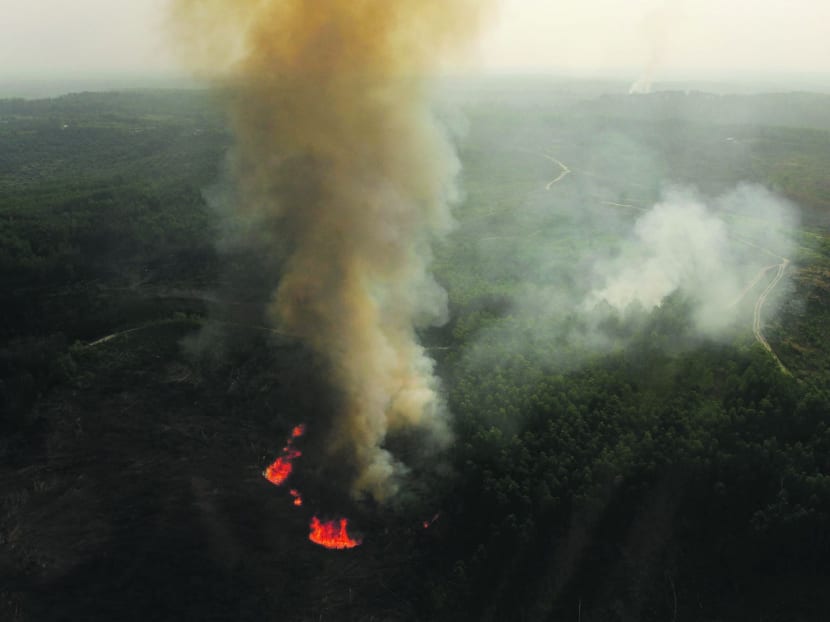Activists rap Indonesia’s failure to fortify deforestation ban
JAKARTA — Activists have criticised a presidential decree issued last week that extends Indonesia’s moratorium on new logging and plantation permits, saying it once again fails to offer strong law enforcement measures to ensure implementation and protect the country’s waning forests.

An aerial view of burning trees is seen during the haze in Indonesia's Riau province on June 28, 2013. Photo: Reuters
JAKARTA — Activists have criticised a presidential decree issued last week that extends Indonesia’s moratorium on new logging and plantation permits, saying it once again fails to offer strong law enforcement measures to ensure implementation and protect the country’s waning forests.
President Joko Widodo last week signed the new decree extending the deforestation moratorium, which was first introduced by his predecessor, Mr Susilo Bambang Yudhoyono, in May 2011.
The original moratorium expired in May 2013, but Mr Yudhoyono extended it for another two years, before Mr Widodo signed another two-year extension last Wednesday (May 13).
It was hoped that the renewed moratorium would curb the illegal burning of Indonesian forests that has been cited as a key cause of recurring haze in the region.
Environmental activists, albeit welcoming the extension, lament the president’s failure to fortify the regulation.
“The government’s move of extending the forest moratorium deserves appreciation,” Greenpeace Indonesia forest campaigner Mr Yuyun Indrayadi wrote on a blog post published on the NGO’s website.
“It is very regrettable, however, that the only thing changing from the previous moratorium is only [the decree’s] number and the period of validity. We’ve found no clauses whatsoever on stronger [law enforcement] and protection in the forest moratorium that will be in place through 2017.”
As many as 63.8 million hectares of Indonesian forests are included in the moratorium, meaning that logging should be strictly prohibited in the areas.
Mr Indrayadi, though, said the moratorium only covered old-growth forests and peatlands that remain free of concessions and are listed as state-owned forests by the Environment and Forestry Ministry.
Some of the forests that fall under the jurisdiction of local administrations are not included in the policy, and so are secondary forests and some primary forests that somehow haven been given concessions that Mr Indrayadi thinks should also be rescued with the moratorium.
In total, 93.6 million hectares of forests should be protected under the moratorium, the campaigner said.
Activists had campaigned for stronger deforestation moratorium months before the previous one expired last week, noting weak law enforcement and poor evaluation of implementation by the Yudhoyono administration.
In 2012, a year after the ban was first imposed, Indonesia surpassed Brazil’s rate of deforestation, becoming the fastest forest-clearing nation in the world, according to a study published last year in the journal Nature Climate Change.
Indonesian Environment and Forestry Minister Siti Nurbaya had talked with NGOs as they voice their recommendations for stronger enforcement.
Mr Arief Yuwono, the deputy minister for environment degradation control and climate change, also earlier said that several issues needed to be addressed before the new moratorium draft could be finalised — including law enforcement, synchronisation with other related, existing regulations and the one-map reference issue.
Overlapping maps of concessions, community forests and protected forests have been identified among the causes of problems in implementation of the deforestation ban by the previous administration.
It looks as though the government’s plan is to just extend the band first, and perhaps revise the substance later.
“We’ve gathered recommendations from ministry officials and NGOs. But we need more detailed discussions [in order to strengthen the moratorium],” Ms Nurbaya said in Jakarta yesterday (May 18), according to newspaper Indopos.
Another Greenpeace activist, Ms Teguh Surya, questioned the minister’s promise for more deliberations.
“The statement from the Environment and Forestry Ministry … offers hope for a stronger moratorium. But the timetable remains unclear, when exactly can the moratorium be strengthened, while forested areas not included in the moratorium will remain prone to destruction. Strengthening the moratorium urgently needs to be done,” said Ms Surya. THE JAKARTA GLOBE






